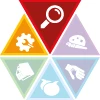Inspector

Inspectors should be great at:
- Estimating sizes, distances, and quantities; or determining time, costs, resources, or materials needed to perform a work activity.
- Observing, receiving, and otherwise obtaining information from all relevant sources.
- Identifying information by categorizing, estimating, recognizing differences or similarities, and detecting changes in circumstances or events.
- Inspecting equipment, structures, or materials to identify the cause of errors or other problems or defects.
Strategist

Most strategists should excel at:
- Establishing long-range objectives and specifying the strategies and actions to achieve them.
- Analyzing information and evaluating results to choose the best solution and solve problems.
- Developing specific goals and plans to prioritize, organize, and accomplish your work.
- Scheduling events, programs, and activities, as well as the work of others.
Other work activities related to Environmental scientists and specialists, including health
- Conducting environmental audits or inspections or investigations of violations.
- Evaluating violations or problems discovered during inspections for determining appropriate regulatory actions or for providing advices on the development and prosecution of regulatory cases.
- Reviewing and implementing environmental technical standards, guidelines, policies, and formal regulations that meet all appropriate requirements.
- Providing advices on proper standards and regulations or the development of policies, strategies, or codes of practice for environmental management.
- Analyzing data for determining validity, quality, and scientific significance and for interpreting correlations between human activities and environmental effects.
- Collecting, synthesizing, analyzing, managing, and reporting environmental data, such as pollution emission measurements, atmospheric monitoring measurements, meteorological or mineralogical information, or soil or water samples.







